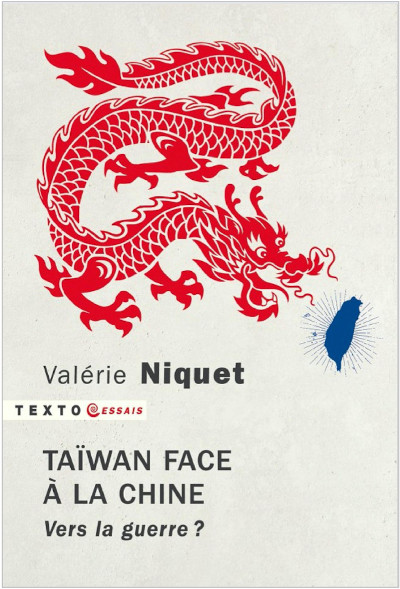In the picture
Cover of Valérie Niquet's book 'Taiwan face à la Chine. Vers la guerre?' (Paris: Éditions Tallandier, 2022) 218 pp. Updated edition in 2023.
With so much that has been published recently on the Taiwan question - and more, logically, that will be published: in fact, this was the decade of maturity of the conflict, despite the fact that unplanned wars such as those in Ukraine and Gaza have taken preeminence in terms of information - it would seem impossible to produce a compendium that at once summarizes the historical trajectory, explains the keys to the present and ventures possible developments in the short and medium term. Valérie Niquet, a French researcher in Asian affairs at the Fondation pour la Recherche Stratégique (FRS), has done so in a paperback edition of barely 200 pages with B success.
To the question posed at degree scroll of the book, written in French - "Towards war?"The author prudently does not give a definitive answer, but makes some observations: the integration of Taiwan, the old Formosa, into China is an inalienable aspiration of Beijing; China is ready to incorporate the island by force, but for the moment it does not have sufficient operational military power for an effective invasion; the Taiwanese are wary of any promise of political autonomy that might be offered to them from the mainland (the formula of 'one country, two systems' is taking on water in Hong Kong).... This being the case, Niquet believes that the present status is likely to be prolonged.
In the face of China's growing military development that could one day make aggressive action feasible final, there is also a progressive consolidation of Taiwanese identity, so that the island is slowly moving towards pro-independence approaches. The increasingly totalitarian nature of the regime imposed by Xi Jinping is causing disaffection in the international community, according to the author, so that a large part of the West could stop defending the 'one China' doctrine and start recognizing Taiwan's independence, ultimately committing itself written request to its defense; this would be the only hope of deterrence against Beijing's war plans and an alternative without war.
This open door for Taiwan to get its way - apart from futures beyond time such as the collapse of the People's Republic and a democracy eventually encompassing the two territories - sets the rather optimistic tone of the book. This is by no means naïve, but at times it gives the impression that the pages of the book want to look more at the positive side of things. For example, the consideration that Xi's authoritarianism is only winning him enemies in the world is not true; it is enough to see how lonely the West has been left alone against Russia or China on various issues to suspect that we are heading towards a two-bloc international order. Nor is Taiwan's own democracy safe; at a time of widespread populism, falsehoods and erosion of the division of powers, who knows if one day Taipei might evolve towards a model that the West (or what is left of it) is reluctant to extol.
Niquet also endorses the elements that underlie the particularity with which the Taiwanese see themselves, even though they are for the most part part part of the same ethnic group as the mainland Chinese. instructions China's empire over Taiwan was late and weak; Japan's domination of the island in the first third of the 20th century laid the foundations for a technical development that later put Taiwan far ahead of Mao's China; the Kuomintang's recovery of the island and then its colonization after the end of the civil war constituted a dark period darker than that of Japanese rule.... Certainly all that, along with the fact that Taiwan was never part of the People's Republic, feed a sense of collective uniqueness that can crystallize into a distinct national project , the thing is that in looking at it sympathetically, Niquet seems to take sides on something that, in terms of a sense of identity, is left to the Chinese on both sides of the strait.

